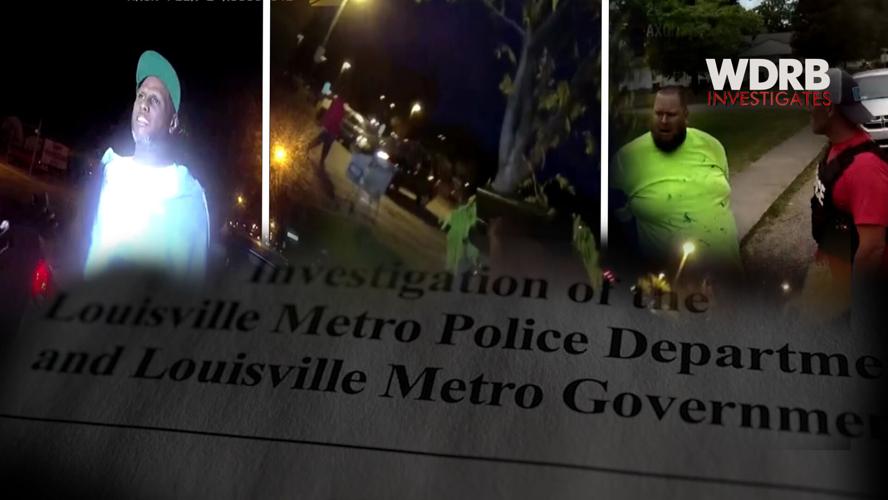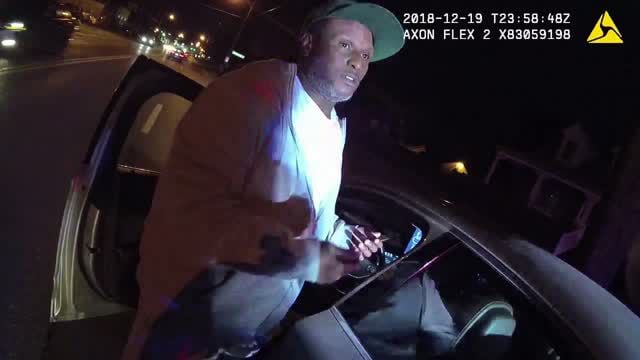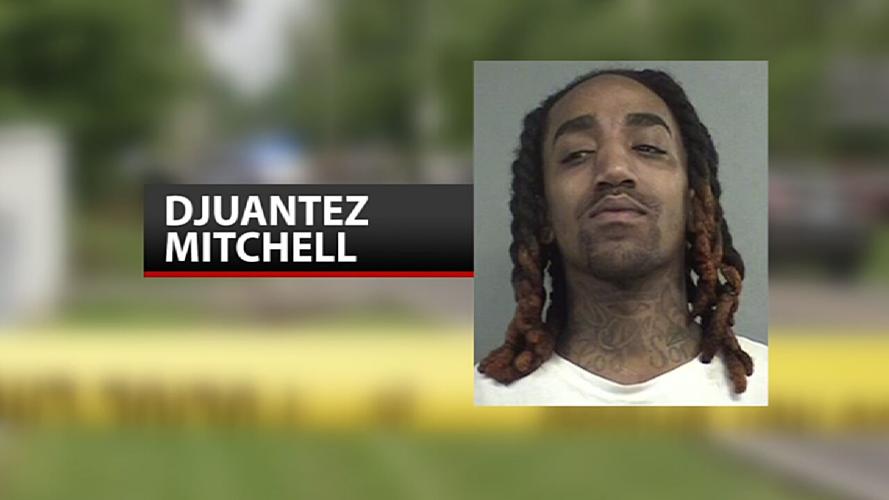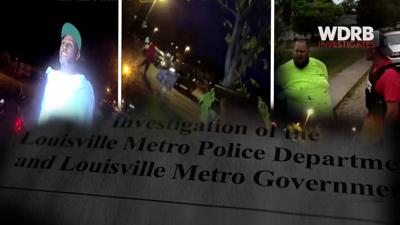LOUISVILLE, Ky. (WDRB) -- When Metro government asked a judge to dismiss Marlo Brown's lawsuit claiming his civil rights were violated during a traffic stop, his attorneys responded by entering new evidence from an unusual source: the United States Department of Justice.
Brown's case was specifically mentioned in the DOJ's investigation of the Louisville Metro Police Department this year, when it accused officers of "unlawfully stopping, searching, detaining and arresting citizens during 'street enforcement activities,' including traffic stops."
In Brown's incident, one of many reviewed as part of years-long inquiry into the department, the DOJ report noted that "officers told a driver whose young children were in the car that they would call in a police dog if he did not consent to a search."
The U.S. Department of Justice launched a 'pattern or practice' investigation of the Louisville Metro Police Department in April 2021.
The "conclusions drawn in the DOJ report are of high relevance to this case," Brown's attorneys wrote in April.
Their approach is being used by other lawyers to strengthen cases against the city and police department. That has thrust Jefferson County Attorney Mike O'Connell's office — which represents the city in lawsuits — into an awkward position: having to argue against a report the city and police have publicly accepted and agreed to use for necessary changes to the department.
Several current lawsuits are citing the DOJ report. In one case, the appeal of a dismissed lawsuit against police for serving a warrant on the wrong person has since been buttressed with federal investigators' findings about the department's repeated warrant mistakes.
In a wrongful death lawsuit filed by a man shot by police in 2020, attorneys are asking a judge to order someone from Metro government with knowledge of the DOJ investigation to testify about findings that police have a history of excessive use of force and have failed to properly train or supervise officers.

Greg Simms, the attorney for the family of Djuantez Mitchell, wants to hear evidence on the information the DOJ used to justify its findings about race discrimination and use of force, "and whether or not the LMPD agrees or disagrees" with the findings, according to court records.
"This report paints a painful picture of LMPD's past but it helps point us in the right direction for our future," Mayor Craig Greenberg said when the report was released in March.
In fact, former LMPD Chief Steve Conrad even testified earlier this year in a lawsuit against police that he had no reason to question the DOJ findings.
"The Department of Justice knows what they're doing — and I don't doubt their findings," Conrad said in a deposition for a lawsuit filed by the family of a man killed by officers.
Simms, who is attempting to use the DOJ report in multiple lawsuits, noted that the county attorney's office is supposed to be working hand in hand with the department to correct the problems found with LMPD.
"There are some county attorneys who are on these civil cases who refuse to acknowledge that the Department of Justice report is accurate," he said in an interview. "They refuse to acknowledge that the findings are based on legitimate instances and data."
In part, the County Attorney's office is arguing that the DOJ and Metro government have not officially agreed to the findings and are still negotiating the terms of a court-enforced consent decree that will guide the reform measures.
The city cannot be required to testify as to what "Metro will agree to and disagree with in the wake of a consent decree which has not (yet) occurred," according to a filing in one case by the County Attorney's office. "This type of interference in the consent decree settlement process would not only be unfeasible and unwarranted in this case but highly destructive to the community and reform process."
In another case, the County Attorney argued neither Metro government nor LMPD has agreed with the report's accuracy.
In the Brown case, the County Attorney's office claims the report "does not provide sufficient basis for the conclusory statements made. It simply provides a few brief examples of the purported violations, largely in the form of generalized hearsay. The Report is certainly not binding on the Court."

Marlo Brown's lawsuit claims his civil rights were violated during a traffic stop in 2019.
Simms, however, said the information in the DOJ report is "extremely solid," pointing out it includes interviews with officers, police officials and people involved in cases, as well as incident reports and internal and criminal investigations,.
"You have a federal agency that does not come in and do a quick overview," he said. "They do an extremely in-depth investigation. And they don't haphazardly throw together conclusions. ... It's very good evidence."
In a statement, Josh Abner, a spokesman for the county attorney's office, said the DOJ report contains "general allegations for which there has not been a legal determination and it does not provide access to the underlying investigation."
In addition, Abner said the current "agreement in principle" between the city and DOJ recognizes the "vast majority" of LMPD officers are not included in these allegations and the report lacks the legal and factual basis to be considered as evidence in specific civil cases.
Prompted by the death of Breonna Taylor in 2020, the Justice Department review concluded that it has probable cause to believe that LMPD and Metro government "engage in a pattern or practice of conduct that deprives people of their rights under the Constitution and federal law" that includes excessive force, searches based on invalid warrants and conducting unlawful traffic and pedestrian stops.
It's unclear when the consent decree will be filed.
The use of these DOJ reviews in other cities has met with mixed results.
In Cleveland, for example, a federal appeals court ruled that plaintiffs in a lawsuit against police must prove the city "approved" of unlawful activity and not just tolerated or condoned it, as the DOJ had concluded.
In St. Louis, one judge allowed the use of the DOJ report on the Ferguson police department in a lawsuit involving the use of a taser on a mentally ill person, while another court refused to admit it as evidence in an alleged unlawful traffic stop suit.
Earlier this year, in Minneapolis, attorneys for the city argued earlier this year that a DOJ report on the police department should not be allowed as evidence in a lawsuit filed on behalf of a journalist who claimed they were attacked by law enforcement after the killing of George Floyd.
So far in Louisville, the County Attorney's office has lost in at least one of its motions to prohibit the use of the federal findings - the Marlo Brown case.
U.S. District Court Judge David Hale ruled on Sept. 28 that the DOJ report "interjects new facts and evidence that were not previously available to Plaintiffs or the court" and the County Attorney's office did not produce any evidence that the report lacked "trustworthiness."
Attorney Ashlea Hellmann, who represents Brown, said it is an important ruling that "helps prove patterns with LMPD that we all know exists.
"I think that, in my opinion, it shows that the court sees the DOJ report as being more than just skepticism or theory," she said in an interview. "They see it as being valid evidence that a jury should hear."

Several current lawsuits are citing the DOJ report.
Copyright 2023 WDRB Media. All Rights Reserved.




